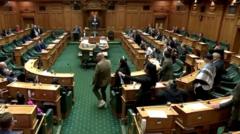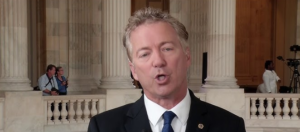A powerful haka performed by opposition MPs aims to disrupt proceedings while thousands march against a proposed bill that seeks to redefine the Treaty of Waitangi principles, igniting a national debate over Māori rights.
Haka Disrupts New Zealand Parliament Amid Controversial Treaty Bill

Haka Disrupts New Zealand Parliament Amid Controversial Treaty Bill
Protests erupt as MPs perform traditional haka in response to a contentious treaty reinterpretation bill in New Zealand's parliament.
New Zealand's parliament faced an extraordinary scene as opposition party MP Hana-Rawhiti Maipi-Clarke led a haka to express discontent over a contentious bill aimed at reinterpreting the Treaty of Waitangi, the country’s founding treaty with Māori. Following her response to the bill's support, parliamentary proceedings were briefly interrupted by this traditional ceremonial dance.
Concurrently, a hīkoi, or peaceful protest march, organized by a Māori rights group, is advancing through the nation towards the capital, Wellington. The 10-day protest, which began at the Cape Reinga, reached Auckland on Wednesday, with an estimated 5,000 participants crossing the Auckland Harbour Bridge, causing lane closures to accommodate the marchers.
Opponents fear that the proposed legislation poses significant risks to the rights of Māori, despite New Zealand's reputation as a leader in indigenous rights. The Act party, backing the bill, claims it will address perceived racial divisions by defining the treaty's principles through parliamentary legislation rather than judicial interpretation.
Nevertheless, critics argue that the bill could erode crucial support for Māori and lead to further division within the country. The first reading of the bill was passed after a brief intermission, receiving support from the ruling coalition but facing opposition over its implications.
Participants in the hīkoi, including Māori citizens and supporters, expressed their hopes for a unified and inclusive approach to national identity, with testimonies highlighting the importance of the Treaty of Waitangi.
The bill has been marked controversial due to its lack of Māori consultation and legal ambiguities regarding treaty principles. Critics within and outside the coalition, including Prime Minister Christopher Luxon, have labeled it divisive, while the Waitangi Tribunal warns that the measure misinterprets the treaty, which has already had adverse effects on Māori communities.
As the debate rages on, the hīkoi continues its journey, representing a resistance against perceived injustices and a demand for acknowledgement and rights for the Māori people, who represent 18% of New Zealand's population but often experience disparities in vital societal aspects.
The bill will undergo a six-month public hearing process at a select committee, with continued vocal opposition from various groups advocating for the preservation of Māori rights and identity under the Treaty of Waitangi.




















